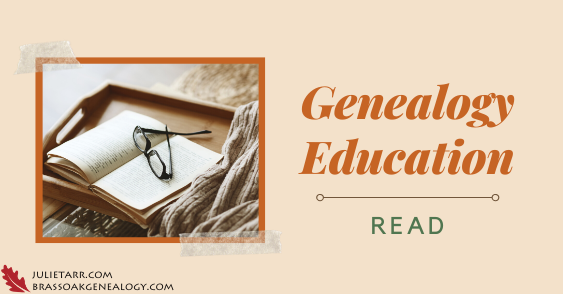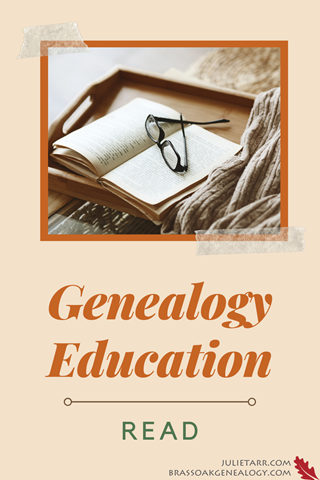Education is important for genealogists to undertake. With a vast array of records that we consult to the techniques that we use to solve tough problems, it’s vital that we stay in the know and continually learn. This is a topic that I am passionate about. Had I not taken steps to educate myself from the beginning of my journey, I would not be where I am today with a nicely defined (although still in progress) pedigree and the ability to help others trace their roots.
This is the first in a series of posts about genealogy education. In this post, we’ll focus on reading, one of my favorite learning methods.
Note: This page uses Amazon affiliate links. You can read my full disclosure statement here.
Books
There are many books out there on the subject of genealogy. Anything from beginning genealogy to advanced methodology, record types to DNA, and more. My reference shelf consists of all sort of books. The following are some staples that I think every genealogist should have:
- Red Book: American State, County & Town Sources, Third Edition – While this book is available through the Ancestry.com Wiki, I prefer the book version. I can highlight it, stick post-its all over it, write notes, and flip back and forth with ease. Although this latest edition was published in 2004, it’s still a valuable resource. It’s organized by state and goes through the various records types and repositories. Handy tables for each state show each county, along with its formation date (and if it was formed from another county), and the beginning dates for vital, land, probate, and court records.
- The Source: A Guidebook of American Genealogy, Third Edition – Also available through the Ancestry.com Wiki, it’s another book where I prefer the hardcopy for the same reasons mentioned above. Still relevant even several years after this edition was released, this book is organized by topic and gives a good overview of each topic. Particularly helpful for beginners and intermediates who are transitioning to more advanced research.
- The Researcher’s Guide to American Genealogy, Fourth Edition – This book is similar to The Source and there is some overlap in topics. However, they’re each presented differently and it’s sometimes better to reference both. Each one covers topics the other doesn’t.
- Professional Genealogy: A Manual for Researcher, Writers, Editors, Lecturers, and Librarians – NOT just for professionals, this is a wonderful resource even if you have no plans to do genealogy for a living. It covers a variety of topics from research reports to transcriptions to writing family histories, as well as information targeted at the professional such as business management and marketing.
- Professional Genealogy: Preparation, Practice & Standards – While I have not had the chance to sit down and read this new tome, I do know that it is a complete update from the original ProGen book (above). It was completely revamped with today’s genealogist in mind. A friend also explained that she still refers to both books, so you might want to grab both.
- Evidence Explained: Citing History Sources from Artifacts to Cyberspace, Third Edition – This book covers the preferred standard for citing sources in the genealogy world. While it serves as a reference for endless citation scenarios, the first chapter is dedicated to evidence analysis, which should be read and reviewed often.
- Genealogy Standards, Second Edition – This book documents a set of generally understood standards in the genealogy community. While it’s the basis for those seeking certification through the Board for Certification of Genealogists, it is seen as a guide for quality genealogy research for everyone, from beginners to experts.
- Mastering Genealogical Proof – This is a workbook to help genealogists understand and use the Genealogical Proof Standard as defined in Genealogy Standards (above). Also available for Kindle.
- Mastering Genealogical Documentation – This workbook-style book helps readers understand the logic that goes into crafting citations (which by doing so also helps researchers understand the source and the information and evidence it contains). Also available for Kindle.
In addition to these general resources, it’s a good idea to have books covering special subjects related to your research or interests. Here are a few examples from my bookshelf:
- The Family Tree Guide to DNA Testing and Genetic Genealogy, Second Edition
- Genetic Genealogy in Practice (also available for Kindle)
- Courthouse Research for Family Historians: Your Guide to Genealogical Treasures
- Land & Property Research in the United States
- The Family Tree German Genealogy Guide: How to Trace Your Germanic Ancestry in Europe
- The Family Tree Irish Genealogy Guide: How to Trace Your Ancestors in Ireland
- Guide to Genealogical Writing
For additional recommendations, check out my Genealogist’s Reference Shelf.
Blogs
Reading blogs is a cheap (that is, free!) way for us to learn about a whole gamut of things. Blogging is a popular way for genealogists to share their knowledge with others, and there is no shortage of genealogy blogs. Genealogy bloggers tend to share their research in order to demonstrate methodology and/or how to use particular sources, sort of like case studies that can be helpful to all of us. Additionally, many bloggers write instructional or information posts on anything from software to research techniques. To find genealogy blogs of interest, check out GeneaBloggers TRIBE and Genealogy Blog Finder.
Wikis
Wikis are a great source of cheap (again, free!) education. Most of us are familiar with Wikipedia, which is basically an online encyclopedia. It covers a wide range of topics, and is useful to genealogists looking for information on events, places, and people. For genealogy-specific topics, check out the FamilySearch Research Wiki. Here you can read up on research techniques, resources, locations, and more! If you’re interested in DNA for genealogy, you should also check out the International Society of Genetic Genealogy Wiki.
Scholarly Journals
Journals, especially those that are peer-reviewed, can provide a wonderful learning opportunity. As genealogists, we need to read the case studies and narratives provided in these journals and take the nuggets they provide and apply them to our own research. Don’t skip these article just because it’s not about your family. There’s much to learn, such as lesser-known or unique resources, ideas to advance our own research, and techniques to solve even our most challenging brick walls. Following are some of the peer-reviewed journals I’d recommend:
- National Genealogical Society Quarterly – Peer-reviewed journal featuring research articles and case studies covering a wide range of geographical areas and ethnic groups. Published four times a year, this comes with a paid National Genealogical Society (NGS) membership. NGS members also have access to past issues dating back to 1912.
- New England Historical & Genealogical Register – Peer-reviewed journal containing research articles that focus mainly on the New England region. Published quarterly, this comes with a paid New England Historic Genealogical Society (NEHGS) membership. NEHGS members also have access to PDFs of past issues dating back to 2010, and can search the society’s database for articles dating back to 1847.
- The American Genealogist – An independent peer-reviewed journal published quarterly, similar to NGSQ. Available through subscription.
Many local and state societies publish some type of journal. Some are similar to the NGS Quarterly or The Register, while others are a little broader in content and may contain informational and instructional articles similar to magazines (discussed below).
Magazines
Most genealogy magazines are considered mainstream, but there are some societies the produce them as well. Magazines tend to run informational and instructional articles aimed at helping genealogists build upon their skills thereby making these sources a valuable educational tool. Here are a few I recommend:
- NGS Magazine – Provides informational and instructional articles covering a variety of genealogical topics. Also contains newsy information about the society and its members. Published four times a year, this comes with a paid NGS membership. NGS members also have access to past issues dating back to 2005.
- American Ancestors – Similar to NGS Magazine, but with some emphasis on New England. Published quarterly, this comes with a paid NEHGS membership. NEHGS members also have access to PDFs of past issues dating back to 2010. Past issues of its predecessor, New England Ancestors, from 2000 to 2009 can be found in the society’s database.
- Family Tree Magazine – Mainstream magazine featuring how-to articles and research guidance. A one-year subscription includes seven issues; available in print and electronic versions.
- Your Genealogy Today – Mainstream magazine containing informational and instructional articles that cover broad topics and locations. A one-year subscription includes six issues; available in print and electronic versions.
- Internet Genealogy – Mainstream magazine covering genealogy as it relates to the Internet and technology. A one-year subscription includes six issues; available in print and electronic versions.
Syllabus Material
I must admit, this is one educational resource I overlook. But recently, I’ve been combing through a stack of handouts and conference syllabuses looking for information on a few different topics. I’ll bet you have your own stack, or perhaps a jam-packed digital folder, with syllabus materials just waiting to provide you with information.
There you have it. If reading is one of your preferred learning methods, I hope you find this post an encouragement to go forth and read!


